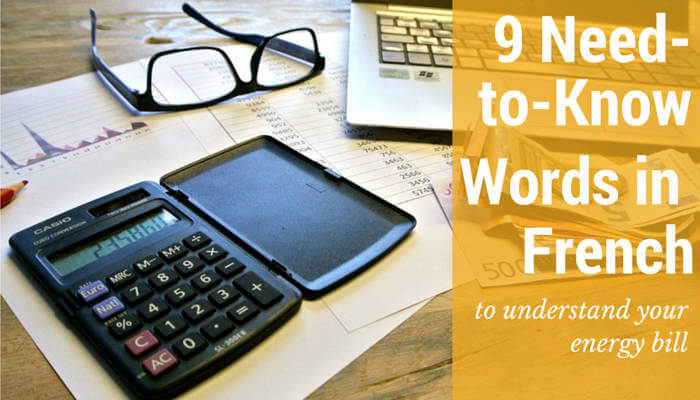9 French Words for Understanding Your Energy Bill in France

Abonnement
"Abonnement" translated: Subscription charge
Why it's important: Your energy bill in France contains three charges: a fixed subscription charge (abonnement), taxes and a variable consumption charge that is based on your energy consumption x the per kWh rate for the energy you consume. Annual subscription charges vary according to suppliers, and are charged at different rates depending on your consumption profile.
Consommation
"Consommation" translated: Consumption
Why it's important: In France your energy consumption may be estimated ("consommation sur index estimé" or "consommation annuelle de référence" CAR) or, if you have a smart meter, an actual reading (in which you will see "consommation sur auto-relevé"). Estimated consumptions are adjusted twice a year when ERDF/GRDF technicians come to read the meter. Many suppliers, including EDF, allow you to submit a meter reading online.
Conso
"Conso" translated: Consumption
Why it's important: "Conso" often refers to the consumption class for natural gas. Depending on your consumption class, you may see Conso = Base, B0, or B1.
Facture TTC
"Facture TTC" (toutes taxes comprises) translated: Total bill with taxes
Why it's important: Value-added tax (in French, TVA) is applied to energy use, including subscription charges and other energy-related taxes (yes, taxes are taxed - welcome to France!)
Panne réseau / Dépannage
"Panne réseau" translated: Network failure
"Dépannage" translated: Repair
Why it's important: While in most cases your energy supplier is your first point of contact for questions (about opening an account, your bill, payment, etc), you need to contact the delivery network operator in the event of a power outage or interruption in your gas supply. For electricity this is Enedis (formerly ERDF), which you can reach at 09 72 67 50 + the 2-digit code for your department (e.g. for La Rochelle the emergency power outage for Enedis is 09 72 67 50 17, while for Bordeaux it is 09 72 67 50 33). If you smell gas or suspect that it leaking, call GRDF at 0 800 47 33 33. Both numbers are free to call when dialed from a landline in France.
Point de comptage et d'estimation (PCE)
"Point de comptage et d'estimation" translated: Site ID (gas)
Why it's important: The PCE is a 14-digit number that your supplier uses to identify the location of your gas meter. Energy suppliers need this number when you are signing up for a new account for natural gas or switching suppliers.
Point de livraison (PDL)
"Point de livraison" translated: Site ID (electricity)
Why it's important: The PDL is a 14-digit number that identifies the location of your electricity meter, much like an address for your house. The PDL will be noted on your electricity bill, but if you've just moved to France and don't know the PDL for your new home, your supplier will be able to find it with the full address (including apartment number and floor, for flats), and/or with the name of the previous occupant.
Prélèvement automatique
"Prélèvement automatique" translated:Automatic withdrawal/direct debit
Why it's important: While many energy suppliers accept multiple forms of payment (e.g. online, over the phone, by cheque, etc), it is customary to set up automatic withdrawal when opening an electricity or gas account. Online-based plans, which tend to offer the best deals, often have automated payment as a requirement.
Puissance souscrite
"Puissance souscrite" translated: Subcribed power rating
Why it's important: In France you can choose the power rating (puissance de compteur) for your meter, which ranges from 3 kVA to 36 kVA. It is important to choose the right puissance for your needs as electricity prices change depending on the power rating assigned to your meter. Most homes in France are on 6 kVA, though some smaller residences (e.g. a small studio apartment without electric heating) may be able to get by with 3 kVA.
Still confused? Check out our guide to understanding energy bills in France!
 alt="energy in france" />
alt="energy in france" />
